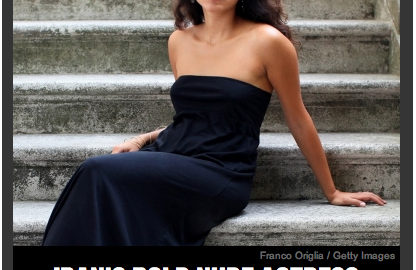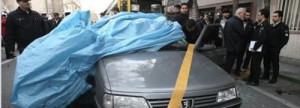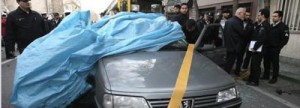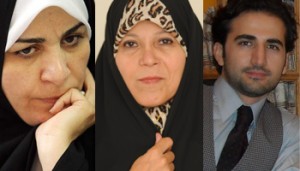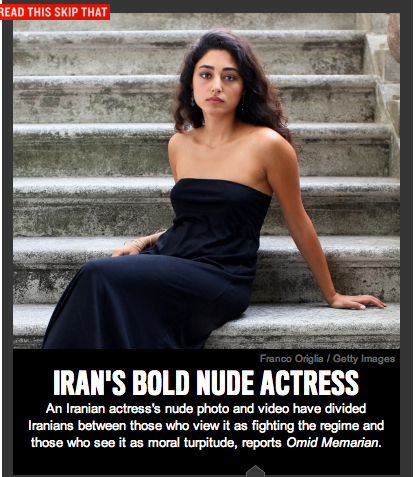
The Daily Beast- A nude photo and breast-baring video of the actress have divided Iranians who see it as striking a blow against Tehran’s Islamist extremism, and those who condemn it as an example of Western moral turpitude.
| January 20, 2012 4:45 AM EST
The publication of a nude picture of a popular Iranian actresscurrently in exile in Paris has sparked enormous Internet buzz, and polarized many Iranians conflicted about nudity—at a time that Iran’s independent movie community is under severe repression by authorities. Is it a courageous act of challenging Islamic and cultural taboos, or an insensitive and selfish move that might give Tehran hardliners an excuse in to put more pressure on Iran’s independent film community?Earlier this week, France’s Madame Le Figaro magazine published a photo of Golshifteh Farahaniin which she posed with her hands covering her breasts. In a short videoplaced on the Internet by the academy that gives out the César—the French version of the Oscar—Farahani is seen with other individuals selected for an award. Everyone is removing their clothes, but only Frahani shows her bare breast to the camera.
Farahani 28, who is also a musician, is one of Iran’s most popular actresses. She started her career in theater age 6, and appeared in her first film at 14. She has received a number of prestigious awards, such as a Silver Bear from the Berlin International Film Festival (2009) for the movie, Elly, directed by Asghar Farhadi, who received a Golden Globe Award for his new film, The Separation, last week. Farahani has starred in more than 15 films, including Ridley Scott’s Body of Lies (2008), with Leonardo DiCaprio.
Less than 24 hours after the photo and video appeared on Facebook, thousands of people had shared or commented on them. Some saw the actress as brave to ignore the taboos in Iran. Considering Farahani was born after the Islamic Revolution and is considered a child of the Islamist system enforced by the Iranian regime, some saw her behavior as a protest against oppressive policies that for the past three decades have done things like force women to wear the hijab.
Over the past several weeks, Iranian authorities have tried to shut down the Cinema House, Iranian cinema’s largest independent association, with some extremists criticizing what they called a consistent lack of regard for Islamic moral code within the Iranian film industry. And some critics say publishing a controversial photo of someone who earned her fame in the Iranian film industry would provide an excuse for such extremists to attack Iranian actors and expand their crackdown on the film industry.
“It is naïve to presume an act of an individual as representative of a whole generation—Golshifteh—represents nothing,” said Ali Reza Eshraghi, Rotary fellow in the Communication Department at the University of North Carolina, Chapel Hill. “We don’t know anything about the motives behind and the context of her decision, but we know that she has decided to continue her profession in France, which has a different system of morality and different decorum of business than Iran.”
“While some pundits praise Golshifeth’s nude appearance as if she has shocked the Islamic regime, I believe that the regime quietly enjoys and benefits from the photo, portraying her as a symbol of an opposition movement who is affected by the corrupt Western liberal democracies,” Eshraghi added.
Golshifteh is not the first Iranian to appear nude before the camera after the 1979 Revolution. In a 2006 film, Scream of Ants, directed by acclaimed Iranian director Mohsen Makhmalbaf, the actress and TV peronality Luna Shad was seen naked in some scenes—something unprecedented since the Islamic Revolution.
“Opposing this photograph is totally understandable in the existing atmosphere inside Iran, because the environment is not ready for such actions,” Luna Shad told The Daily Beast in a telephone interview. “But I’m surprised at the reactions of Iranian intellectuals outside Iran.
“Though Iranians outside Iran are talking about democracy and freedom, I can see that their reaction to Golshifteh’s choice in her environment in France is not that different from how they reacted to my choice seven years ago.”
Well-known media critic Mehdi Jami wrote in his blog, Sibestan: “When the sanctimonious regime was driving thousands upon thousands of Iranians abroad, making them refugees of the world, it never thought it was preparing the basis for changes that would, sooner or later, affect the situation inside the country. Because these thousands upon thousands live among other cultures, and they enjoy freedoms that would change their behavior and the effect of their choices will no longer just stay outside Iran.
“Today, immigrant Iranians have turned into a source of change for those inside the country and use different media for communicating with their own people and this is history joking with a regime that has been our most ill-humored political and thinking system.”
The pro-government media in Iran, however, harshly criticized the actress.
“In the latest published photograph of Golshifteh Farahani in France’s Le Figaro newspaper, she has surpassed even Western countries’ low moral values, and has appeared completely naked in front of the camera; something that even her fans would have never believed,” said the Young Journalists Club (YJC), affiliated with the Iranian state television,.
On the actress’s Facebookpage—she has 86,000 fans—the photo was posted with the following text: “Golshifteh Farahani breaks the taboo of the so-called Islamic Hejab for Iranian actors in Le Figaro’s Madame Magazine…there are a lot of nude photographs on the internet, but the nude picture of this exiled Iranian actress is different. This is for freedom and objection to censorship in Iran. This image is a scream against a society that is full of violence, racism, sexual discrimination, sexual abuse, and duplicity.”
In December 2009, a short time after appearing in Body of Lies, Golshifteh told the Voice of America Persian that cinema is the first and last love of her life, but that she couldn’t enjoy playing in Iranian films any more. When asked about the price she might have to pay for her choice, she said, “This direction [of my life] has been defined. For the perspective I had for my future, I had to go through this path.”
Fariba Davoodi Mohajer, a women’s rights activist, always maintained her Islamic hijab, until she moved to the U.S. in 2006. In 2010, Davoodi removed her hijab during an appearance on the popular VOA program, Parazit. The move triggered pro and con reactions.
“The Iranian woman is limited to the brutal judgments of ‘musts’ and ‘must nots’ and interference in her private domain, a collection of walls and glass holds that make her hopeless, passive, and smothered to death,” Mohajer said. “The critical atmosphere created after the photograph’s publication not only shows the truth among the conservatives and those related to the Iranian regime, but also among those who claim to support freedom and Iranian seculars, who would define freedom only within the realm of patriarchal relations.”
Responding to the question of whether Golshifteh Farahani’s naked photocould lead to pressure on Iran’s independent cinema, Ali Abdi, an activist and anthropology Ph.D. student at Yale University, told The Daily Beast he believes Iranian leaders do not need any excuses for shutting down civil organizations.
“If we say that the rulers would take advantage of Golshifteh’s photograph, it means that we have accepted the illegal methods of the rulers,” Abdi said. “We must not sacrifice Golshifteh’s freedom, nor anyone else’s, for passing interests.”
Prior to the 1979 Islamic Revolution, half-naked photographs were widely published in magazines and even in films. Alt such images always angered the religious class, the cultural apparatus of the shah, himself an avid supporter of drawing the Iranian society closer to the West, never made any effort to crack down.
Not surprisingly, given taboos about sex and sexuality in Iran, Golshifteh’s parents said the photo was fabricated. This could explain why, several hours after the publication of the parents’ opinions, the photo was removed from both Le Figaro’s website and her Facebook page
“My daughter is currently in India and she is well. I am her mother, and I assure you that my daughter does not do nudity or things like that,” Fahimeh Rahimian, Golshifteh’s mother, told the YJC News Agency.
“I don’t know whether those who have been pushing this idea have even asked themselves why my daughter would do a thing like this?” Golshifteh’s father, Behzad Farahani, told YJC. “A sick person has put this photograph on the Internet and has written some sentences underneath it, and he has thought that the people have easily accepted it.
Eshraghi, the UNC-Chapel Hill fellow, noted that, “Many objections came from the so-called modern and secular young generation who is in favor of the pro-democratic Green Movement and many of them live in Western countries.” He added that, “This shows that the Islamic regime is still able to sell part of its ideology; what I call the ‘politics of looking.’ For ayatollahs, looking could be adultery by means of the eyes. A considerable number of Iranian people—wittingly or unwittingly—have bought this argument.”
But how might the nude photo controversy affect Iran’s political scene and pro-democracy movement?
“The story of Golshifteh Farahani has in fact ‘bared’ some of the social changes that have taken place in Iran, but it must be emphasized that this is only a portion of the changes,” Morteza Kazemian, an Iranian pro-democracy political analyst living in Paris, told The Daily Beast. “The citizens’ demands include the entirety of their basic and civil rights, for which the authoritarian rulers have no respect. Even their right to vote is taken away and their protests are answered with bullets, sticks, and imprisonment.”

